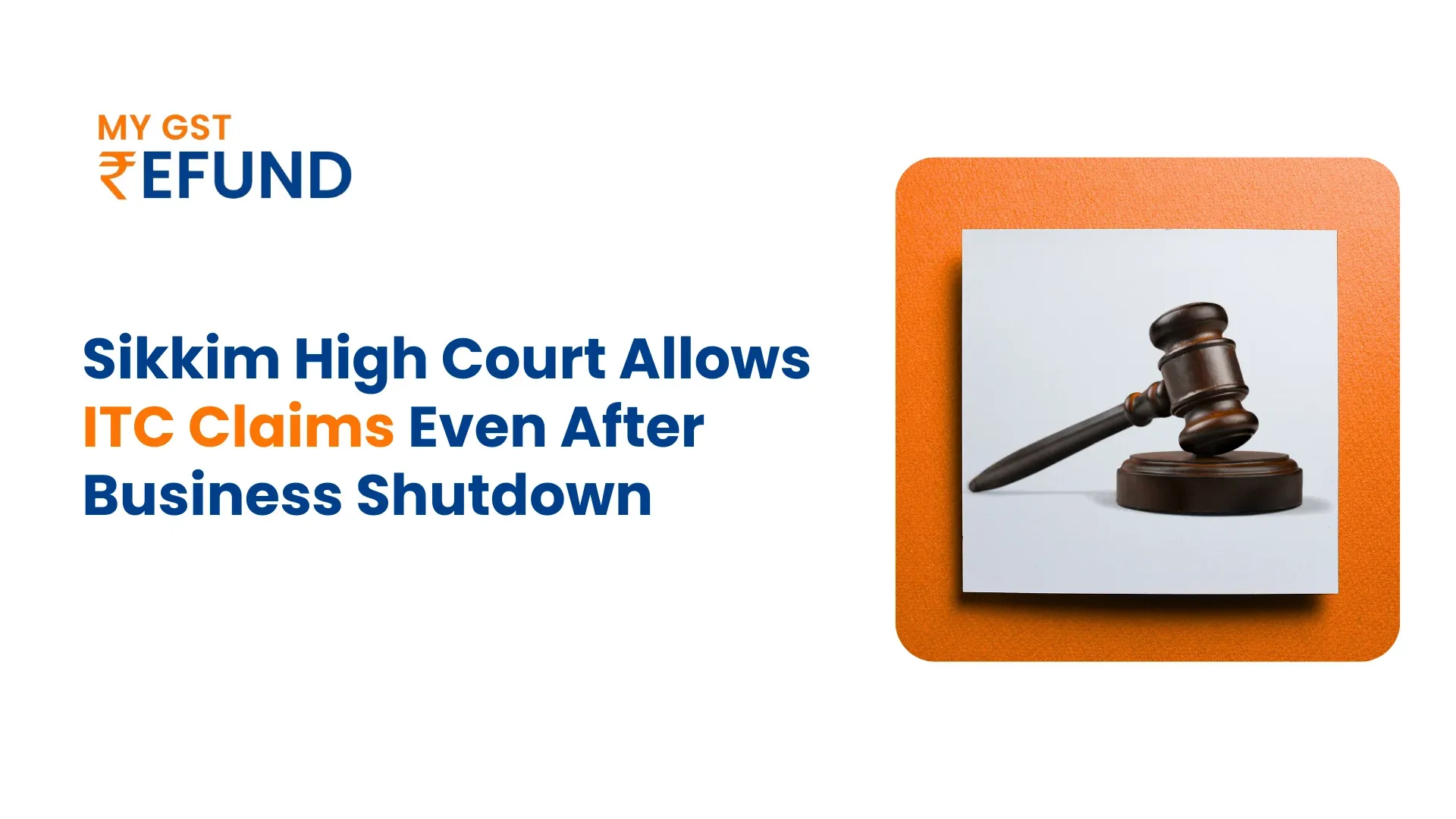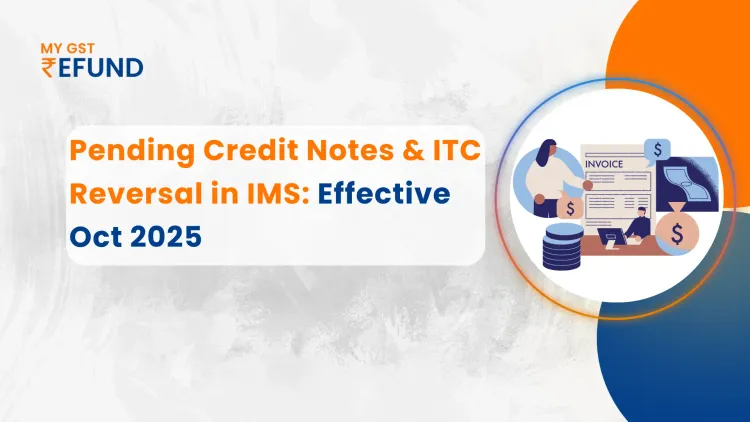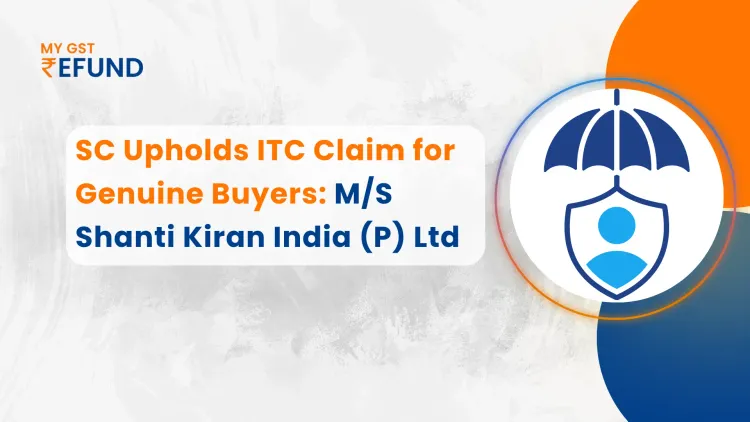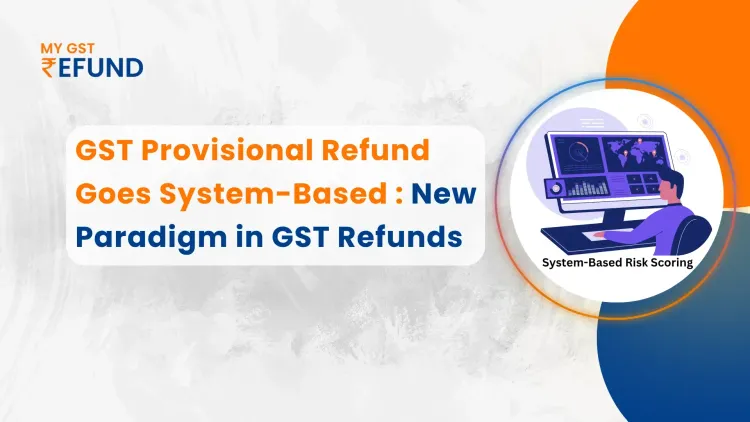Sikkim HC Allows Refund of Unutilized ITC on Business Closure
Published on: Mon Jun 16 2025
Refund of unutilised Input Tax Credit (ITC) allowed in Closure of Business: SICPA India Private Limited and Another Vs Union of India and Others
Refund of unutilized Input Tax Credit (ITC) allowed in Closure of Business: SICPA India Private Limited and Another Vs Union of India and Others
In the recent case of SICPA India Private Limited and Another Vs Union of India and Others, we have seen a Judgement on the Refund of Unutilized Input Tax Credit(ITC) allowed in the closure of Business by the Sikkim High Court.
MyGST Refund Have Decoded the whole case and presenting the synopsis of the same, in summary we can say that the Petitioner SICPA India Private Limited was engaged in Manufacturing Security Inks with GST Registration in the State of Sikkim, had undergone the Closure of Business in January 2019 and petitioner reversed all the Input Tax Credit (ITC) as per the CGST Act 2017, after selling the machinery and production facilities.
Petitioner had the Input Tax Credit (ITC) balance of Rs. 4,37,61,402, for the same petition applied for GST Refund in “Any Other” category, which was later rejected by the authority. After this, the petitioner filed an appeal, and here is the full case study.
Facts of The Case:
1. The Petitioner, SICPA India Private Limited, was engaged in the Business of Manufacturing Security Inks, with the GST Registration in the State of Sikkim.
2. The company underwent closure of the business in January 2019 in the state of Sikkim. The petitioner sold all the machinery and manufacturing facilities between April 2019 and March 2020. They also reversed the appropriate Input Tax Credit (ITC) as per the applicable provision of the CGST Act 2017.
3. The Petitioners had accumulated balance of ITC amounting to Rs. 4,37,61,402, on account of the closure of its business and accordingly claimed refund of such unutilized ITC balance, in terms of Section 49(6) of the CGST Act, which entails that the balance in Electronic Credit Ledger after payment of tax, penalty, fee or in every amount payable may be refunded in accordance with the provisions of Section 54 of the CGST Act, which was refused and has given rise to the Petition.
4. The Petitioners applied for a GST refund under the category "Any Other" to claim the unutilized Input Tax Credit (ITC) lying in their Electronic Credit Ledger after closure of their business. However, the refund application was rejected by the Assistant Commissioner, CGST & Central Excise, Gangtok, on 08-02-2022, citing that a refund is not permitted upon business discontinuation.
The Petitioners appealed the decision before the Additional Commissioner, CGST & Central Excise, Siliguri, but the Appellate Authority upheld the rejection on 22-03-2023. Consequently, the Petitioners approached the High Court seeking to quash the said appellate order and to clarify that the proviso to Section 54(3) does not restrict refund of unutilized ITC under Section 49(6) of the CGST Act in cases of business closure.
Contentions of the Petitioner
1. Right to Refund under Section 49(6) : They argued that Section 49(6) of the CGST Act clearly allows a refund of any unused balance in the Electronic Credit Ledger after paying taxes and other dues.
2 . Support from (Section 54): Section 54 gives the procedure for claiming a refund, and there's no restriction in it that stops a refund just because a business is closed.
3 . Section 54(3) is not exhaustive: Section 54(3) only mentions two specific cases (exports and inverted duty structure) where unutilized ITC refund is allowed, but it does not say that other situations are prohibited. Therefore, it shouldn't be used to deny a refund in other genuine cases, like business closure.
4.No legal provision for lapse of ITC on closure: They claimed that there is no section or rule under the GST law that says the ITC will lapse if a business is closed. So, unused ITC should not be denied just because the company shut down.
5. Vested right to ITC : The company had legally earned and accumulated ITC, and thus has a vested right to claim a refund of the same. It cannot be taken away without a clear law saying so.
6.No discussion by Appellate Authority: They said the Appellate Authority failed to explain why Section 49(6) does not apply, and wrongly upheld the rejection without proper reasoning.
7 . Support from case laws:
A.Eicher Motors Ltd. vs. Union of India: The Supreme Court ruled that credit legally earned cannot lapse without a clear law.
B.Slovak India Trading Co. vs. Union of India: Karnataka High Court allowed refund of CENVAT credit after business closure, as there was no express bar in the law.
C.Shabnam Petrofils Pvt. Ltd. vs. Union of India: The Gujarat High Court ruled that a notification causing lapse of credit is invalid if the law itself doesn’t provide for it.
Contentions of Tax Authorities
1. Refund Not Permitted on Business Closure: The authorities argued that the GST law does not recognize business closure as a valid ground for refund of unutilized Input Tax Credit (ITC). Since the Petitioners had discontinued operations, the refund was not eligible.
2. Section 54(3) is Restrictive: As per Section 54(3) of the CGST Act, refund of unutilized ITC is allowed only in two specific situations:
A. Zero-rated supplies (exports without payment of tax)
B. Inverted duty structure (tax on inputs > tax on outputs)
Since the Petitioners' case did not fall under either, the refund was not allowed.
3. Section 49(6) Doesn’t Provide an Independent Right: Authorities submitted that Section 49(6) does not independently grant a refund, but only says that a refund can be made “in accordance with Section 54”. Therefore, a refund under Section 49(6) is still subject to the restrictions in Section 54(3).
4.No Provision to Allow Refund in Case of Closure: There is no specific clause in the CGST Act or rules that allows a refund of ITC simply because the business has closed. Hence, in the absence of an enabling provision, a refund cannot be granted.
5. Legal Interpretation Should Be Strict in Tax Law: Since tax refund is a statutory right (not a fundamental right), it must be clearly provided by law. In their view, allowing a refund beyond what is clearly permitted under the statute would amount to judicial overreach.
6 . Proper Reversal of ITC Already Done: The authorities might have also noted that the Petitioners had already reversed the ITC during closure (as per Point 4 of the case facts), so the question of refund may not arise again.
Court’s Observation and Decision
1.No Law Prevents Refund on Business Closure: The Court noted that there is no clear prohibition in the CGST Act (specifically in Sections 49(6), 54, or 54(3)) that denies refund of unutilized ITC when a business is closed.
2. Section 49(6) allows a Refund, Subject to Section 54: Section 49(6) does allow a refund of the balance ITC, and while it must follow the procedure in Section 54, it does not restrict the reasons for refund unless expressly mentioned.
3. Section 54(3) Lists Allowable Situations but Doesn’t Forbid Others: While Section 54(3) specifies two scenarios where refund of unutilized ITC is permitted, the law doesn’t say that refund is forbidden in other genuine cases like business closure.
4. The State cannot Retain Tax Without the Authority of Law: The Court emphasized that the government cannot retain taxes or credit that belong to a taxpayer without clear legal backing. If ITC is legally earned and not used, it must be refunded.
5. Relied on Earlier Judgments: The Court referred to the Slovak India Trading case (Karnataka High Court), where the refund of unutilized CENVAT credit was allowed after the closure of business, and the Eicher Motors case (Supreme Court), which held that accrued credit is a vested right unless the law specifically says it lapses.
6. Set Aside the Appellate Order: The Court ruled in favor of the Petitioners and quashed the appellate order dated 22-03-2023, which had rejected the refund.
7. Ordered Refund of Unutilized ITC: The Court directed the authorities to refund the unutilized Input Tax Credit (₹4.37 crore) to the Petitioners, as per law.
MYGST Refund Observation
The Sikkim High Court’s decision permitting refund of unutilized ITC upon closure of business, while seemingly taxpayer-friendly, relies heavily on earlier jurisprudence like Slovak India Trading Co. and lacks support from any explicit GST provision. Notably, it appears to sidestep the binding Supreme Court ruling in VKC Footsteps India Pvt. Ltd.
MYGST Refund observes that while the judgment offers relief, its precedential strength is uncertain, and businesses must be wary due to the high litigation risk until clearer legislative or judicial guidance emerges.
In case you are not sure about the GST Refund Eligibility, check your GST Refund with India’s first-ever Automated GST Refund Calculator.
Related Posts





